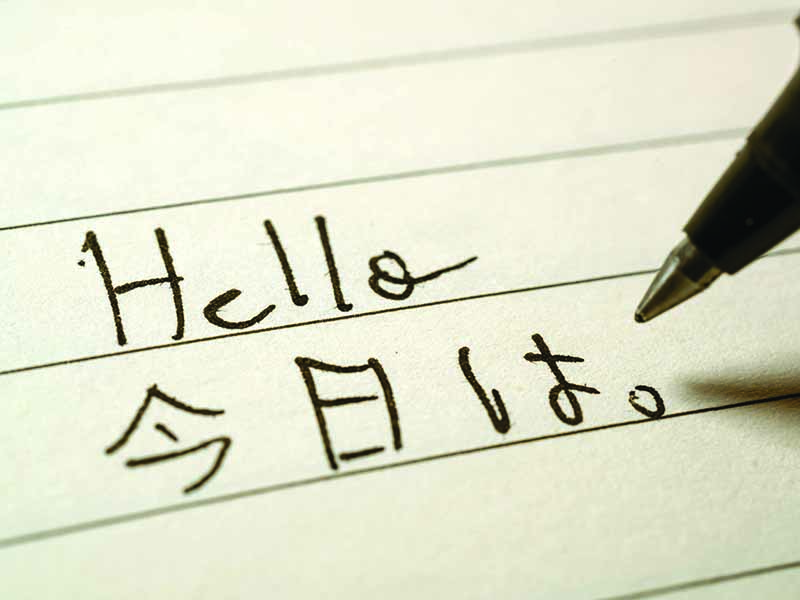No products in the cart.
Good future in learning Japanese
Improved trade relations between Japan and India have created a plethora of career options for those fluent in this language
 In this newly emergent global economy where cross-border networking and business alliances are becoming commonplace, and globe trotting for business and pleasure has become routine, there are excellent job opportunities for qualified multilingual professionals, including executives and managers. Therefore, a growing number of students are taking to learning foreign languages.
In this newly emergent global economy where cross-border networking and business alliances are becoming commonplace, and globe trotting for business and pleasure has become routine, there are excellent job opportunities for qualified multilingual professionals, including executives and managers. Therefore, a growing number of students are taking to learning foreign languages.
One foreign language gaining rapid popularity within student and professional communities is Japanese. Improved trade relations between Japan and India, multiplying Indo-Japanese joint ventures, and an upsurge in Japanese foreign direct investment (FDI) during the past few years — particularly in the automotive vehicles sector — have generated persistent demand for qualified translators as also for workers and professionals with a working knowledge of Japanese. Moreover, confronted with a manpower shortage, Japanese corporates are on the lookout for professionals to staff their offices and factories in Japan as well.
Most top-rung universities in the country offer diploma, degree, and/or certificate study programmes in foreign languages. The duration of courses varies from six months to four years. For instance, Mumbai University offers a certificate course and a four-year degree programme in Japanese, so do Delhi and several other major universities. The Central Institute of English and Foreign Languages, Hyderabad, offers a Master’s (correspondence-cum-attendance) programme in Japanese and other languages for diploma and degree holders.
AUTOMATICALLY ELIGIBLE. In Delhi’s showpiece Jawaharlal Nehru University (JNU) School of Languages, a five-year integrated MA programme in Japanese among other foreign languages is offered to Plus Two level school leavers. Admission is on the basis of an objective type entrance test, which assesses students’ English language skills and general knowledge. Students completing the three-year BA (Hons) programme in Japanese automatically become eligible for the two-year MA programme. This is the most comprehensive and well-reputed Japanese learning programme available in India.
Universities apart, there are numerous foreign language training institutes which offer beginners and advanced study programmes in Japanese. Language courses are also conducted by the Indo-Japanese Association, Mumbai, supported by the Japanese consulate. The embassy in Delhi and consulate in Mumbai offer certificate and diploma courses, and those who pass four levels can read for an advanced diploma taught by the embassy/consulate. In other metros check the local Indo-Japanese Association for tuitions.
“Learning Japanese is a good idea considering large-scale Japanese involvement in global industry and trade. With a slew of Japanese electronics and automobile companies setting up shop here, the number of Indo-Japan joint ventures is multiplying rapidly. Their detailed technical manuals require well-qualified translators, and the demand from software companies and banks for personnel familiar with Japanese is also on the rise,” says Sarita Sundaram, head of the Japanese language teaching department of the Indo-Japanese Association, Mumbai.
Sundaram was introduced to this culturally rich language by accident but has grown to love it. In 1988, Sundaram, who had just completed class X at St. Joseph’s Convent, Bandra  (Mumbai), had to relocate to Japan with her father who was working with the Shipping Corporation of India. At that time she had no option but to join the best Japanese language school in Tokyo (Nihongo Gakka) where she intensively studied the language for two years and attained an advanced diploma. After returning to India in 1990, she enrolled for the English literature bachelor’s programme of Mysore University which she followed up with a Master’s in linguistics from Mumbai University. Immediately thereafter she was snapped up by Toyo Engineering (India) as a translator where she worked for six years. In 1998, she joined the Indo-Japanese Association as freelance translator while working with Batliboi & Co as a technical translator.
(Mumbai), had to relocate to Japan with her father who was working with the Shipping Corporation of India. At that time she had no option but to join the best Japanese language school in Tokyo (Nihongo Gakka) where she intensively studied the language for two years and attained an advanced diploma. After returning to India in 1990, she enrolled for the English literature bachelor’s programme of Mysore University which she followed up with a Master’s in linguistics from Mumbai University. Immediately thereafter she was snapped up by Toyo Engineering (India) as a translator where she worked for six years. In 1998, she joined the Indo-Japanese Association as freelance translator while working with Batliboi & Co as a technical translator.
“Until 10 years ago, Mumbai’s Indo-Japanese Association had only one teacher. Now, I have a team of 10 working under me and we hold classes throughout the week as 70 percent of our students want to make a career centred around knowledge of Japanese. In fact, every year on the first Sunday of December, the Japan Foundation holds a worldwide examination known as the Japanese Language Proficiency Test. Because of overwhelming demand, we have started classes in Navi Mumbai as well,” says Sundaram.
Looking ahead, Sundaram believes that Indo-Japanese trade and interactivity is poised to intensify. “There’s growing interest in Japanese culture in India and vice versa with Indian television programmme becoming popular in Japan,” she opines.
Therefore for those with a yen for languages, this is a good time to learn Japanese.
(Excerpted and adapted from 101 Great Careers for the 21st Century by Indra Gidwani)














Add comment